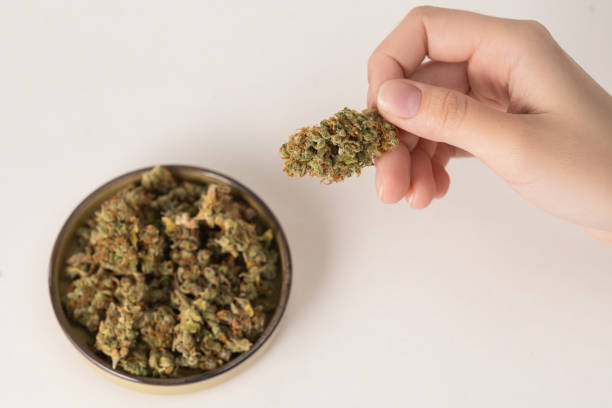In recent years, a new cannabinoid has gained significant attention in the cannabis industry—Delta-8 THC. Often referred to as a milder or less potent cousin of the well-known Delta-9 THC, Delta-8 has sparked both curiosity and controversy. While its chemical structure closely resembles Delta-9 THC, Delta-8 offers a distinct experience that appeals to those seeking the benefits of cannabis without the intense psychoactive effects typically associated with Delta-9. In this article, we will explore what Delta-8 THC is, its effects, benefits, risks, and its legal status, along with why it’s become a topic of debate in both the cannabis community and beyond.
What is Delta-8 THC?
Delta-8 THC is a naturally occurring cannabinoid found in cannabis, though in relatively small amounts. It is an analog of Delta-9 THC, which is the primary psychoactive compound responsible for the typical “high” that cannabis users experience. The difference between Delta-8 and Delta-9 lies in their molecular structure. Both cannabinoids share the same chemical formula, but the placement of a double bond differs slightly. Delta-8 has a double bond on the eighth carbon chain, while Delta-9 has it on the ninth. This small difference makes a big impact on how each compound interacts with the body.
Delta-8 THC is often synthesized from CBD (cannabidiol) extracted from hemp, due to its naturally low concentration in the cannabis plant. In its synthetic form, it is commonly sold in a variety of products, including vapes, edibles, tinctures, and oils.
How Delta-8 THC Works in the Body
Delta8 THC interacts with the endocannabinoid system (ECS), a complex network of receptors, enzymes, and molecules that regulate various physiological processes, such as mood, pain, appetite, and memory. Specifically, Delta-8 binds to the CB1 receptors in the brain and nervous system, but it does so with less potency than Delta-9 THC. This results in a gentler, less intense high compared to traditional cannabis.
Because of this milder effect, Delta-8 has been described as offering a clear-headed high—more relaxed and less anxious than its Delta-9 counterpart. Many users report feeling a slight euphoria, increased creativity, and a sense of calm without the paranoia or overwhelming mental fog that can sometimes accompany Delta-9.
Delta-8 THC Effects: A Milder High
The effects of Delta-8 THC are often described as being somewhere between CBD and Delta-9 THC. Users typically experience a mild euphoria, relaxation, and improved mood. Unlike Delta-9 THC, which can lead to anxiety or paranoia for some users, Delta-8 is generally considered to be more tolerable for those who are sensitive to the psychoactive effects of cannabis.
Common effects of Delta-8 THC include:
Mild Euphoria: Delta-8 provides a sense of happiness or upliftment, but without the intense mental stimulation or confusion that can come from Delta-9 THC.
Relaxation: Users often report feeling calm and at ease, with less tension in both the body and mind.
Increased Focus and Creativity: Some people find that Delta-8 enhances their ability to focus on tasks and think creatively.
Pain Relief: Like other cannabinoids, Delta-8 may offer pain-relieving effects, though they are typically milder than those of Delta-9 THC or CBD.
Anti-Nausea Effects: Delta-8 has been shown to help with nausea and vomiting, making it a potential option for individuals undergoing chemotherapy or dealing with chronic nausea.
The effects of Delta-8 THC typically last for 4-6 hours, depending on the dosage and method of consumption. In comparison to Delta-9, the high tends to be less intense, which many users appreciate.
Potential Benefits of Delta-8 THC
While research on Delta-8 THC is still in its early stages, there are several potential therapeutic benefits that are already gaining attention:
Anxiety and Stress Relief
Because Delta-8 THC offers a milder high than Delta-9, it may be a promising option for individuals seeking relief from anxiety and stress. Its calming effects can provide relaxation without the risk of triggering heightened anxiety, a common side effect of Delta-9 THC.
Pain and Inflammation Management
Like many cannabinoids, Delta-8 may have anti-inflammatory and analgesic (pain-relieving) properties. Some users report that Delta-8 helps alleviate symptoms of chronic pain, muscle spasms, and inflammation, making it a potential treatment option for conditions like arthritis and fibromyalgia.
Appetite Stimulation
Delta-8 THC has been shown to increase appetite, similar to Delta-9 THC. This effect can be particularly beneficial for individuals who have a reduced appetite due to conditions like cancer, HIV/AIDS, or anorexia.
Anti-Nausea Effects
Delta-8 has also been noted for its antiemetic (anti-nausea) properties. Some studies suggest that Delta-8 may help reduce nausea and vomiting, especially for individuals undergoing chemotherapy or dealing with digestive issues.
Neuroprotective Effects
Early research indicates that Delta-8 THC may have neuroprotective properties, potentially protecting brain cells from damage caused by oxidative stress or inflammation. This suggests that Delta-8 could be useful in preventing or slowing down the progression of neurodegenerative diseases like Alzheimer’s and Parkinson’s.
Risks and Side Effects of Delta-8 THC
While Delta-8 THC is generally regarded as safe, it is not without risks and potential side effects. Since Delta-8 is often synthesized from CBD, there is a risk of contamination during the production process, especially in products that are not properly regulated. Consumers should always purchase Delta-8 from reputable sources that provide lab-tested products to ensure safety and purity.
Common side effects of Delta-8 THC include:
Dry Mouth: Like other cannabinoids, Delta-8 may cause dry mouth, which can be alleviated by drinking water.
Red Eyes: Delta-8 can cause bloodshot eyes due to its effect on blood vessels.
Drowsiness: Some individuals may feel sleepy or lethargic after consuming Delta-8, especially at higher doses.
Mild Paranoia or Anxiety: Although Delta-8 is less likely to cause paranoia compared to Delta-9, some users may still experience mild discomfort or anxiety.
The Legal Status of Delta-8 THC
One of the most controversial aspects of Delta-8 THC is its legal status. Delta-8 is often derived from hemp, which is legal under the 2018 Farm Bill. However, the legality of Delta-8 varies by state, with some states explicitly banning it due to concerns over its psychoactive effects. Other states have remained silent on the issue, allowing Delta-8 to be sold legally.
In states where cannabis is illegal, Delta-8 has gained popularity because it is typically synthesized from hemp-derived CBD, which is legal under federal law. However, lawmakers are starting to pay closer attention to Delta-8, and there has been growing concern about its safety and potential misuse, leading to some states introducing legislation to restrict its sale.
Conclusion
Delta-8 THC offers a unique option for cannabis consumers seeking a gentler, more controlled experience. With its milder psychoactive effects, it may be a suitable alternative for individuals who find Delta-9 THC too intense or anxiety-inducing. While research on Delta-8 is still in its infancy, early findings suggest that it may offer a variety of potential therapeutic benefits, including anxiety relief, pain management, and anti-nausea effects.
However, consumers should exercise caution, particularly with unregulated products, as the safety and purity of Delta-8 can vary significantly across the market. As the legal status of Delta-8 continues to evolve, it’s important for users to stay informed about the current regulations in their state.
Ultimately, Delta-8 THC represents a promising development in the cannabis industry, with the potential to carve out its own niche in the rapidly growing world of cannabinoids.
Medical Disclaimer:
The information provided in these blog posts is intended for general informational and educational purposes only. It is not a substitute for professional medical advice, diagnosis, or treatment. Always seek the advice of your physician or other qualified healthcare provider with any questions you may have regarding a medical condition. The use of any information provided in these blog posts is solely at your own risk. The authors and the website do not recommend or endorse any specific products, treatments, or procedures mentioned. Reliance on any information in these blog posts is solely at your own discretion.







